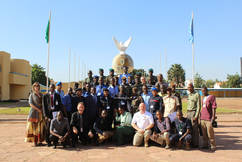Malian Security Forces Trained on Freedom of Expression and the Safety of Journalists
Bamako 26 November 2016 – The UNESCO Bamako Office, EUCAP Sahel-Mali and the International Organisation of la Francophonie (OIF), organized, in partnership with the Ministry of Security and Civil Protection, two training workshops on freedom of expression and the safety of journalists from 21 to 26 November. The workshops, held at the Alioune Beye Peacekeeping School in Bamako (EMP-Bamako), occurred following the successful organization of the first series of workshops on this subject in Mali, organized from 13 to 18 June.
The opening ceremony was chaired by the representative of the Ministry of Security and Civil Protection. The Head of the UNESCO Bamako Office and the Chief of Operations of EUCAP Sahel-Mali were also present.
The objective of the two three days trainings, which gathered fifty officers from the national police, the gendarmerie, the National Guard, Civil Protection, trainers from EMP-Bamako and ten journalists, was to establish more professional relations between security forces and journalists, thereby fostering an enabling environment for freedom of expression and the safety of journalists. Moreover, four members of the security forces trained in June were selected as assistant trainers to the trainers selected by UNESCO, EUCAP Sahel-Mali, and OIF in order to further strengthen their capacities in terms of training techniques.
In his opening speech, Mr. Hervé Huot-Marchand, Head of the UNESCO Bamako Office, underlined that the training program is in line with UNESCO’s mission to promote a culture of peace and respect for fundamental rights such as freedom of expression, which cannot exist without ensuring the safety of journalists. He stressed the importance of the UN Plan of Action on the Safety of Journalists and the Issue of Impunity, which UNESCO coordinates. This plan aims to create a safe and secure environment for journalists and media professionals, including social media producers, in conflict and non-conflict situations. Mr. Hervé Huot-Marchand reiterated UNESCO’s support to strengthening the media sector in Mali.
The Chief of Operations of EUCAP Sahel-Mali stressed that his mission would support the development of dialogue between security forces and the media. He stressed that cooperation could only be achieved through building trust and transparency in relation to citizens, through the promotion of press freedom, and respect for the rule of law and public freedoms.
The representative of the Minister of Security and Civil Protection, on behalf of the Minister, thanked the UNESCO Bamako Office and their partners for their joint effort in the capacity building of the security forces.
During the six days of training, subjects covered included security procedures in the field, the essential protection of journalists, ways to guarantee journalists access to the information they need, communicating with media, and freedom of expression.
The main trainer, chosen by UNESCO and OIF, used a mixed pedagogical approach (presentations, group discussions, sessions of questions and answers and practical exercises) to enable participants to understand the different concepts and topics addressed during the workshop.
At the end of the two trainings during the closing ceremony on 26 November, the representatives of the security forces paid tribute to all journalists who have died while exercising their profession by observing a minute of silence. This symbolic gesture clearly reflected the new links established between the members of security forces and the media, crucial for the strengthening of Malian democracy.
In recognition of the International Day for the Elimination of Violence against Women on 25 November, and during the closing ceremony, speakers stressed the importance of addressing the specific security risks for women journalists, and the gender based violence they can face in the field. The Representative of the Ministry of Security and Civil Protection of Mali recalled that the media represents the 4th pillar of democracy and stressed the importance of ensuring the continuity of such trainings at the national level in Mali to ensure continued dialogue between law enforcement and the media and thus contribute to the consolidation of peace.
In their closing speeches, the representative of EUCAP Sahel-Mali and the representative of UNESCO in Mali also highlighted the need to expand the training initiative in 2017 to the different regions in Mali to ensure close collaboration and reinforce dialogue between media and security forces to ensure access to information for all. The representatives also encouraged the peacekeeping school and the security forces training schools to adopt the training curricula on the safety of journalists and freedom of expression in the national curriculum.
This project received financial support from EUCAP Sahel-Mali and the OIF and technical support from the Kingdom of Norway.
Video on Training of Security Forces on Freedom of Expression and the Safety of Journalists in Mali :
https://www.youtube.com/watch?v=NBfm3aniDFE&feature=youtu.be
<- Back to: All news


